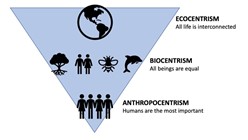13. Green Criminology
13.3 Ecophilosophies Within Green Criminology
Dr. Gregory Simmons; Dr. Mark Vardy; and Dr. Rochelle Stevenson
Brisman and South (2019) identify three main ecophilosophies within green criminology: anthropocentrism, ecocentrism, and biocentrism. Each of these orientations represents a unique lens through which to view harm and crimes against the natural world. The ecophilosophies also work together to provide a more comprehensive picture of the scope and impact of environmental harms.
Anthropocentrism (from the Greek anthro, meaning human being or man) “emphasizes the biological, mental and moral superiority of humans over all other living and non-living entities” (Halsey & White, 1998, p. 349; emphasis in original). An anthropocentric perspective prioritises human wants and needs and views the natural world as a resource to be harnessed, managed, and conserved (Brisman & South, 2019). From this perspective, protection of the water and air is important because humans need them to survive, while the conservation of animal species is important as humans enjoy viewing tigers, elephants, and wolves. An anthropocentric report on the impact of climate change would focus on the impacts on humans (e.g., the reduction of liveable space due to higher water levels and desertification, how droughts and floods impact food security), with little or no attention given to inequalities between humans. Much of criminology already takes an anthropocentric approach, prioritising human victims over animals or the environment. Anthropocentrism also highlights human-focused solutions, such as genetically engineered seeds for higher yields and other technological solutions to environmental problems.
Biocentrism is the opposite of anthropocentrism, perceiving humans as simply one species within the natural world with intrinsic value. A biocentric philosophy does not subscribe to the hierarchy of anthropocentrism, but instead sees every species and being as equal in worth; the person is equal to the tiger, who is equal to the trout, and equal to the oak tree. This also means that if the human population decreases, through a pandemic like COVID-19 for example, the relative decrease in the human impact on the planet is perceived as a positive thing overall for the planet. However, like anthropocentrism, the inequalities and disproportionate negative environmental impacts on particular groups of humans (racialised, impoverished, or Indigenous peoples, for example) is of little interest to biocentrism. Instead, the health and benefit of the earth and environment are the priority.
Contrary to the other two ecophilosophies, ecocentrism “is based on the idea that humans and their activities are inextricably interconnected with the rest of the natural world” (Brisman & South, 2019, p. 5). In other words, humans are part of nature, but are neither above nor below the rest of the natural world. The ecocentric philosophy is relational, recognising that humans need to utilise natural resources to survive but have a corresponding responsibility to use resources in a way that minimises the impact on the environment and other species (Halsey & White, 1998). In the same relational light, ecocentrism is concerned with issues of social justice, such as environmental racism, and seeks to eliminate exploitation of both the natural world and those within it. Policies informed by ecocentrism seek to balance the best interests of humans and non-humans, conserving and protecting resources for the survival and well-being of all. For instance, the drive for increased consumption and throw-away products are challenged by an ecocentric philosophy.

Media Attributions
- The Three Ecophilosophies © Thomas Schaubroeck and Benedetto Rugani adapted by Gregory Simmons, Mark Vardy, Rochelle Stevenson is licensed under a All Rights Reserved license
a perspective that sees every species and being as equal in worth.
a perspective that holds that humans are relationally connected to the natural world and that, while humans need to utilize resources to survive, they have a duty to use resources responsibly and minimize their impact on other species and the environment.

